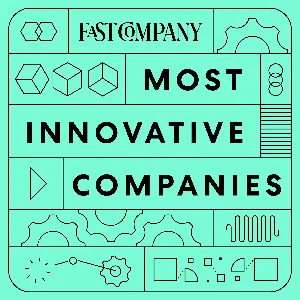Podcast Summary
Danish Pharmaceutical Giant Novo Nordisk Surpasses LVMH as Europe's Most Valuable Company: Novo Nordisk, a Danish pharmaceutical company, is now Europe's most valuable company with a market value over $530 billion, driven by exports of innovative medication to the US and cultural influence of American weight loss trends. Its impact is significant, surpassing Denmark's entire GDP.
Novo Nordisk, the Danish pharmaceutical company behind popular weight loss drugs Ozempic and Wegovy, is making waves in the global economy. With a market value of over $530 billion, it's now Europe's most valuable company, surpassing luxury goods giant LVMH. This rapid growth has come from both the export of innovative medication to the US and the cultural influence of American weight loss trends. Novo Nordisk's expansion is noteworthy as it's larger than Denmark's entire GDP, demonstrating the company's significant impact on the Danish economy and its potential to reshape the American economy as well.
Novo Nordisk's Growth: A Gamechanger for Denmark's Economy: Novo Nordisk's growth transformed Denmark's economy, contributing significantly to its GDP, creating jobs, and driving industrial development in Kalumbor. Its impact extends beyond economics, contributing to education and science.
Novo Nordisk, a Danish pharmaceutical company, has experienced unprecedented growth in recent years, with its market capitalization surpassing Denmark's entire GDP. This growth has significantly impacted the Danish economy, making it a major contributor to the country's growth and tax revenue. Novo Nordisk's expansion has also led to the creation of jobs and economic development in certain areas of Denmark, particularly in the industrial cluster of Kalumbor. This growth may not be immediately noticeable to the average Dane, but the economic transformation is evident in the form of new infrastructure, increased industrial activity, and job opportunities. The company's impact extends beyond economic benefits, as it also contributes to Danish education and science. Overall, Novo Nordisk's success story highlights the importance of a strong pharmaceutical industry in driving economic growth and development.
Denmark's economy could significantly benefit from Novo Nordisk's successful drugs: Novo Nordisk's successful drugs, Wegovy and Ozempic, have massive market potential and high demand, which could lead to significant economic growth for Denmark. However, overdependence on these drugs could stagnate the economy if a competitor overtakes Novo Nordisk.
The success of Novo Nordisk's Wegovy and Ozempic drugs could significantly impact Denmark's economy due to their massive market potential and high demand. The pharmaceutical industry's growth could surpass that of other high technology sectors, making it a major economic driver. However, there is a risk of overdependence on these drugs, as seen in Finland's reliance on Nokia in the early 2000s. This could lead to stagnation if a competitor overtakes Novo Nordisk. The potential implications go beyond economic growth, raising questions about the normalization of weight loss medication use and who will dominate the market. Michael Tuukir of Politiken Newspaper believes Ozempic could even surpass the impact of artificial intelligence on the economy. It's essential for Danish businesses to stay competitive in the pharmaceutical sector and other high technology industries to mitigate the risk of overdependence.
Save money on wireless bills, new Hulu series, affordable spring clothing: Sign up with Mint Mobile for $15/month wireless, watch 'The Veil' on Hulu, shop affordable spring clothes at Quince.com. GLP-1 drugs like Ozempic will have a major economic impact due to their widespread use and affordability.
You can save money on your wireless bill by signing up with Mint Mobile for $15 a month, but keep in mind there's an upfront payment and restrictions apply. Meanwhile, in the world of entertainment, the international spy thriller "The Veil" on Hulu, featuring Elisabeth Moss, is worth checking out if you're into spy thrillers. Moving on to shopping, Quince.com offers affordable spring clothing with free shipping and 365-day returns. Now, for a more substantial takeaway, Josh Barrow from Substack argues that GLP-1 drugs like Ozempic will have a bigger impact on our economy than AI in the long run. With a majority of US adults being overweight, these drugs are expected to be widely used, and their positive effects and affordability make them a significant medical intervention.
Ozempic's Economic Impact: Productivity and Economic Growth: The use of Ozempic, a diabetes drug, could lead to increased productivity and economic growth due to reduced disability rates, potentially resulting in increased consumer spending and industry growth, but specific impacts on industries can vary.
The widely used diabetes drug, Ozempic, not only has significant health benefits but also economic implications. Being overweight or obese comes with medical risks and economic costs, including increased healthcare expenses and disability. With Ozempic's potential to reduce the disability rate, productivity is expected to increase. Moreover, people may have more disposable income and time due to improved health, leading to potential growth in various industries. However, it's important to note that the impact on specific industries can vary. While some may experience a decrease in demand for certain products, others could see an increase due to the overall economic boost. For instance, Walmart has reported a slight pullback in shopping demand from people taking Ozempic, but this could be offset by the increased spending power of those who are more productive and healthier. The financial sector and Wall Street are closely monitoring the situation, recognizing the potential economic benefits of this drug. While there are concerns, many are also optimistic about the positive effects on the economy and industries that could benefit from increased consumer spending. Overall, Ozempic's impact on the economy could be substantial, leading to improvements in productivity and overall economic growth.
GLP-1 Drugs: A Significant and Growing Market: GLP-1 drugs, used for weight loss and diabetes treatment, have high list prices but effective pricing has decreased. Novo Nordisk, Eli Lilly, and Pfizer stand to profit. Potential industry impacts include reduced food consumption and fuel savings.
The market for GLP-1 drugs, such as Wegovy and Zepbound, is significant and growing due to their use in treating weight loss and diabetes. These drugs are expensive, with list prices over $1,000 a month, but effective pricing has come down this year. Drug companies like Novo Nordisk, Eli Lilly, and Pfizer stand to make substantial profits from this market. The potential impact on industries like the restaurant industry and airlines due to weight loss is a topic of interest for investors. While fuel savings from lighter passengers could amount to millions, it's not a significant portion of overall costs. The broader economic impact of GLP-1 drugs may be seen in improved spending patterns in areas where people previously spent on food. The CEO of Novo Nordisk has reportedly been receiving calls from CEOs in industries related to food, likely due to concerns about potential losses in consumption.
New weight loss drugs causing uncertainty and financial implications: New weight loss drugs like Wegovy, Novo Nordisk, and Eli Lilly are expensive and not fully covered by insurance, leading to changes in customer behavior and potential shifts in industries, with eventual coverage by Medicare and other government programs resulting in increased costs for taxpayers.
The implementation of new weight loss drugs like Wegovy and those produced by Novo Nordisk and Eli Lilly is causing uncertainty and significant financial implications for various industries and payers, particularly in the United States. The drugs, which are currently expensive and not fully covered by insurance, are leading to changes in customer behavior and potential shifts in industries. Additionally, the eventual coverage of these drugs by Medicare and other government programs could result in increased costs for taxpayers. For individuals taking these drugs, the experience can be positive, leading to easier weight loss and a changed relationship with food. However, the financial implications for payers, including corporations and taxpayers, are a significant concern during the transition period before prices come down and positive economic effects are fully realized.
Weight loss drugs and their impact on personal habits and economics: Weight loss drugs like Wegovy can lead to time and resource savings, potentially contributing to a more efficient economy, while also challenging societal attitudes towards larger bodies
Weight loss drugs like Wegovy can lead to significant changes in personal habits and economics. For some individuals, the relief from constant focus on weight and dieting can lead to more time and resources for other pursuits. Contrary to initial concerns, this shift may even contribute to a more efficient economy as people make more considered spending decisions. Additionally, there is a growing recognition that not everyone desires to lose weight and that societal attitudes towards larger bodies need to change. This is a complex issue with various implications, and it's essential to continue the conversation around the potential benefits and challenges of weight loss drugs in our society.
Investing in Real Estate Despite Market Downturn: Some investors, like Fundrise, see opportunities for growth in real estate despite high interest rates and market downturn. Minimum investment of $10 to join Fundrise's $1B portfolio, evaluate investment objectives, risks, charges, and expenses before investing.
Despite high interest rates causing a downturn in the real estate market, with demand dropping and prices falling for many top assets, some investors are seeing opportunities for growth. For instance, the Fundrise flagship fund is planning to expand its $1 billion real estate portfolio. This means that even in challenging market conditions, there are still possibilities for investment. If you're interested in adding the Fundrise flagship fund to your portfolio, you can do so with a minimum investment of $10 by visiting fundrise.com/fox. However, it's crucial to thoroughly evaluate the investment objectives, risks, charges, and expenses before investing. This information can be found in the fund's prospectus, which is available at fundrise.com/flagship. Please note that this is a paid advertisement.






